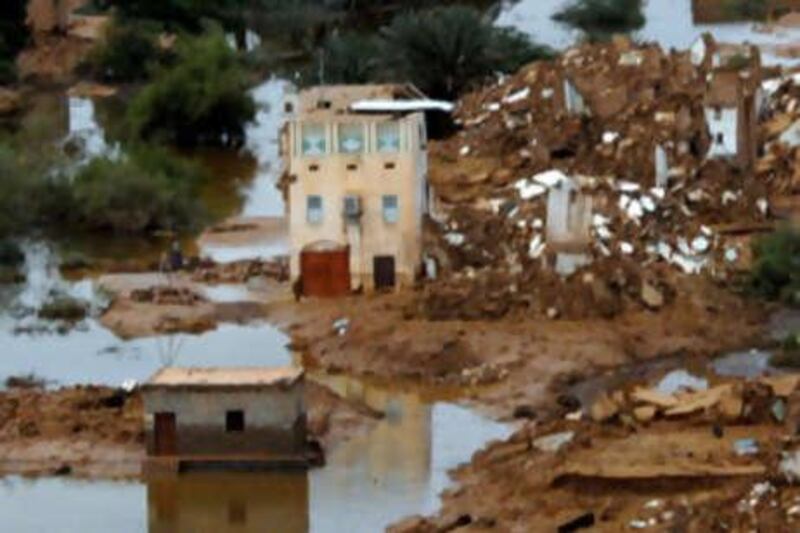SANA'A // The death toll from flash floods that hit eastern Yemen has climbed to at least 61 with dozens more missing, the interior ministry said. The provinces of Hadramut and Mahara - both declared disaster zones on Friday - have been worst hit by the flooding, which was caused by torrential rain on Thursday and Friday.
"The scale of damage is great? in terms of properties, infrastructure, mainly road, power, telephone and water networks, plus citizens' properties including farms, water wells and boats," Ali Abdullah Saleh, the president, told journalists yesterday, as he oversaw search and rescue operations in Hadramut. Local authorities said more than 500 houses were destroyed across the province and 3,500 families made homeless.
Mr Saleh said, however, the situation had started to improve and that the road between Mukalla, the capital of Hadramut, and Ryan, where the airport is located, had been reopened but other vital roads were still blocked. "The Kahwa bin Afan-Seiyoun road which is the artery road linking Sana'a with Mukalla is still blocked. We are extending a constant effort to help carry foodstuffs, medical aid and tents from Sana'a to Seiyoun," he said.
Ali Khawdam, the governor of Mahara, said the floods had left a lot of devastation. "The flood destroyed 200 houses, affected 300 others, blocked roads and affected bridges and electricity and telephone networks. It also swept 220 farms, filled a number of wells, swept away a number of cars and sank 60 boats. Bee farms have been also swept away and a number of cattle have also been killed as a result," he said.
Six people were also killed by lightning in the southern governorates of Taiz and Lahj, and a mother and son died when struck by lightning in the al Mahweet region north of Sana'a. The flooding was caused by a tropical storm that formed in the Indian Ocean last week and headed north, hitting the remote eastern region. Damage has been extensive throughout Hadramut because most homes there are made of mud-brick. Buildings of the Unesco world heritage site of Shibam - "Manhattan of the desert" as it is known in Yemen - are threatened with collapse.
"I saw one house in Shibam collapsing. I felt really bad about the city, which people from all over the world visit," said Amar Mohammed, a resident of Seiyoun city in Hadramut. "Some people are still trapped inside their houses in [Seiyoun], and I have talked to some friends in Tarim by phone and they told me they are trapped inside their houses as rescue teams were not able to do anything for them because helicopters were not able to get in." Mr Mohammed blamed the scale of the damage on the government for allowing illegal construction in flood prone areas. "The main reason behind such catastrophe is the government officials who gave permits some years ago for illegal houses in the flood route, which have diverted waters into the towns," Mr Mohammed said. Mr Saleh, the president, said some businessmen and Yemeni expatriates have offered help and said the military is on alert to assist affected people and those in areas isolated by the flooding. The Civil defence supreme council urged government agencies to start immediate communication with international and regional relief organisations to provide aid. A first batch of six aircraft took off from the capital, Sana'a, yesterday loaded with tents, food and medicine for the afflicted areas. The UAE will also be sending aid. The Mohammed bin Rashid Al Maktoum Foundation is expected today to begin dispatching by air and road basic supplies as well as electricity generators and water pumps, the state-run WAM news agency reported. And Abdullah Hussein al Dafae, the ambassador for Yemen to the UAE, praised Sheikh Khalifa bin Zayed, President of the UAE and Ruler of Abu Dhabi, for providing emergency relief. "We in Yemen, from the bottom to the top leadership, highly appreciate these initiatives which reflect the deep fraternal ties between the two countries and their peoples," WAM reported Mr Dafae as saying. Mr Saleh said the focus is now on rescue, relief and housing homeless people while the second phase is focusing on reconstructing roads, facilities and services. "The government will bear its responsibility in facing the disaster of the floods. We do highly appreciate those who have helped but we will not ask for aid. But we will be thankful to individual persons, organisations or countries willing to help for this is a humanitarian disaster," he said. International relief agencies said they are still monitoring and assessing the situation to identify possible areas of intervention. "We are still monitoring and Oxfam and Doctors without Borders have sent teams to Hadramut to assess the situation," said Khalid al Mulad, country director of the UK Islamic Relief. "We are waiting for their needs assessment reports to see how we international and local organisations can co-ordinate our efforts to avoid duplication. There is good co-ordination between all international and local stakeholders," he said. "The damage is big and we understand that 60 per cent of the people in Hadramut are now without electricity. There is big damage in water, road, telecommunication and other areas and we are waiting to see how we quickly intervene." malqadhi@thenational.ae * With additional reporting by Agence France-Presse





